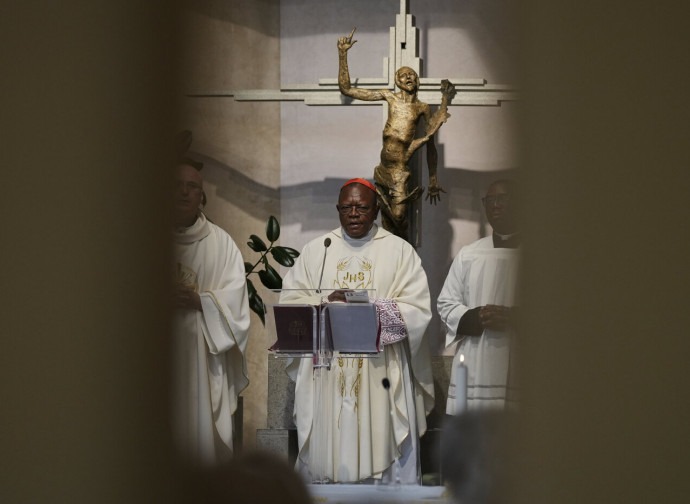The difficult return of cardinals to countries ravaged by war and persecution
Cardinals from Congo, Nicaragua, India and Iran could have requested and obtained refugee status in Rome. Instead, they chose to return to their countries and face persecution alongside the faithful.

Part One: cardinals who deserve refugee status but return to their troubled countries
Cardinal Fridolin Ambongo Besungu (photo above) is returning to his country, the Democratic Republic of Congo, where he will face mounting challenges. He was considered one of the most eligible candidates for the papacy. Had he been elected, the Congolese would have lost a valuable ally.
The Catholic Church in Congo has always championed human rights and justice. Over the years, several clergymen have been arrested, and others have been killed, while participating in peaceful protest marches carrying crucifixes and sacred images, in the hope of protecting the demonstrators. Instead, on more than one occasion, the police opened fire. Cardinal Besungu and other Catholic bishops and priests continue to challenge the government by denouncing corruption, violence and neglect. They also protest against the conditions in which the population is forced to live, especially in the eastern provinces. For decades, these provinces have been the battleground of dozens of armed groups fighting over precious mineral resources. The civilian population there is under constant threat of raids, violence and rape. It is even worse for Christians, as the ADF (Allied Democratic Forces), one of the armed groups, is affiliated with the Islamic State and targets them relentlessly. In February, in the province of North Kivu, the group captured almost the entire population of a village — around 70 Christians — locked them in a church and then beheaded them.
Elsewhere in the country, the situation is less dramatic, but violence is widespread and affects the Church and its structures. In March, the residence of the Sisters of the Congregation of Saint Dominic in Kimbanseke, a municipality in the Kinshasa area, was attacked by armed men carrying pangas, a type of machete. The attackers broke through a wall and stole money, telephones, computers and other valuables from the nuns. Cardinal Ambongo once again sent a statement to the authorities expressing his indignation at this incident.
One of the most difficult journeys home is that of Cardinal Leopoldo José Brenes Solórzano, the Metropolitan Archbishop of Managua, the capital of Nicaragua. Persecution against the Catholic Church in that country has reached almost unbearable proportions. Those responsible are the dictator Daniel Ortega and his wife Rosario Murillo.
Priests are now forbidden to organise open-air celebrations and processions, under threat of immediate arrest. The Way of the Cross during Holy Week and pilgrimages have also been banned. As in the worst regimes, the police have issued guidelines on permitted homily topics: references to human rights, democracy and freedom are excluded, among others. Priests must also regularly report to police stations to have their sermons reviewed and to report on their pastoral activities. Over the past six years, nearly 80% of non-governmental organisations, primarily Catholic, have been shut down or confiscated, totalling over 5,600. Other institutions have been dissolved, including the Poor Clares, whose 'voluntary dissolution' was approved by the Ministry of the Interior in 2023 as they had not received funding to fulfil their objectives since 2021.
The wrath of Ortega and his wife has no limits and extends to anyone. This year, more than 30 Poor Clare nuns were expelled from the country — a fate that has also befallen other religious figures. The most notorious case was the exile imposed on the bishop of Matagalpa, Monsignor Rolando Álvarez, along with other priests, in 2024. He has been a guest of the Vatican ever since. He had previously been sentenced to 26 years in prison, spending 339 days in a maximum-security cell, after being found guilty of treason, spreading false news, inciting violence, conspiracy, and terrorism. Álvarez was also stripped of his Nicaraguan nationality, his property, and all his civil rights.
The safety, freedom and lives of many cardinals depend on how the governments to which they are subject treat the Church. In India, in particular, Hindu nationalists have become increasingly powerful and aggressive since the Hindu BJP party won the elections for the first time in 2014, when its leader Narendra Modi became prime minister, and they now pose a threat to the country's six cardinals and the entire Church. In many other countries, it is Islam that persecutes Christians, both clergy and laity. The 2025 report by the NGO Open Doors on countries where it is most difficult to be a Christian states that Islam is responsible for persecution in nine of the 13 countries where it is classified as extreme, and in 28 of the 37 countries where it is defined as very high.
Among the cardinals at greatest risk is Dominique Joseph Mathieu, Archbishop of Tehran-Ispahan of the Latins since 2021 and cardinal since 2024, because the regime's already high level of intolerance towards the Church in his country, Iran, can take even more extreme forms. There are around 2,000 Latin Rite Catholics in Iran, primarily Filipino. There are perhaps fewer than 800,000 Christians. The worst fate is reserved for converts who have renounced Islam — the most serious sin a believer can commit. Iranian authorities often raid their homes and so-called 'house churches', i.e. private residences where the faithful gather to pray and read sacred texts together. They usually seize personal belongings, crosses, and other symbols of faith.
The growing number of arrests and heavy sentences is an alarming indication of the clear regression in Iran's religious freedom. The most common offences that lead to severe sentences are 'membership of opposition groups', 'propaganda against the system' and 'propaganda activities contrary to Islamic law through relations with foreign countries'. Imprisonment often follows, along with the loss of social rights and various restrictions on freedom of movement — and all it takes is to have been caught praying in community.
